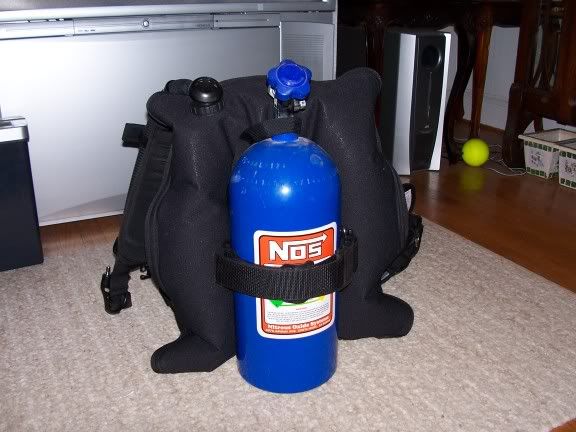Packhorse
Contributor
Ok all you petrol heads out there answer me this.
Can you use nitrox to make your car go faster in the same way Nitrous oxide does?
I cant see why not. There are a few diffrences of course.
What is nitrous oxide(n2o)? Its oxygen and nitrogen atoms joined in an atomic bond to create a Nitrous Oxide molecule. ( is that the correct terms?).
Nitrox on the other hand is just a mix of Oxygen and Nitrogen.
Nitrous oxide contains 36% oxygen. When heated to 572deg F nitrox oxide breaks down into nitrogen and oxygen or 36%Nitrox.
So assuming all that is correct then why not use Nitrox instead of Nitrous oxide?
There are a couple of reason i can think of.
1. At normal storage pressure (1200psi) Nitrous oxide is a liquid. My nitrous oxide bottle holds 10lbs (4.5 kgs). While my 3 times larger air tank holds about the same weight in air. So Nitrous has a space saving advantage.
2. Because Nitrous is a liquid at pressure is looses a lot of heat when released from pressure. This has a tremendous intercooling effect and is very good from a performance point of view. Nitrox will also drop in temp when released from pressure but not as much.
BUT
Nitrox is a hell of alot cheaper than Nitrous oxide. 10lbs of Nitrous oxide NZ$150. 10lbs of Nitrox $20.
So what do you think?
Is there something I am missing?
Now while on the subject. I have heard that Nitrogen narcosis feels like taking a hit of nitrous oxide. Anyone care to coment on that?
I have had a similar feeling when accending too fast. Like from 15m -12m. This obviously is not NN. Any idea what it is?
Can you use nitrox to make your car go faster in the same way Nitrous oxide does?
I cant see why not. There are a few diffrences of course.
What is nitrous oxide(n2o)? Its oxygen and nitrogen atoms joined in an atomic bond to create a Nitrous Oxide molecule. ( is that the correct terms?).
Nitrox on the other hand is just a mix of Oxygen and Nitrogen.
Nitrous oxide contains 36% oxygen. When heated to 572deg F nitrox oxide breaks down into nitrogen and oxygen or 36%Nitrox.
So assuming all that is correct then why not use Nitrox instead of Nitrous oxide?
There are a couple of reason i can think of.
1. At normal storage pressure (1200psi) Nitrous oxide is a liquid. My nitrous oxide bottle holds 10lbs (4.5 kgs). While my 3 times larger air tank holds about the same weight in air. So Nitrous has a space saving advantage.
2. Because Nitrous is a liquid at pressure is looses a lot of heat when released from pressure. This has a tremendous intercooling effect and is very good from a performance point of view. Nitrox will also drop in temp when released from pressure but not as much.
BUT
Nitrox is a hell of alot cheaper than Nitrous oxide. 10lbs of Nitrous oxide NZ$150. 10lbs of Nitrox $20.
So what do you think?
Is there something I am missing?
Now while on the subject. I have heard that Nitrogen narcosis feels like taking a hit of nitrous oxide. Anyone care to coment on that?
I have had a similar feeling when accending too fast. Like from 15m -12m. This obviously is not NN. Any idea what it is?





